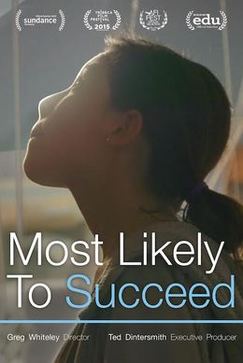For the past two weeks, I have been immersed in the heady broth of the liberal, forward-thinking UVic Education program. I am learning to teach in the infancy of the new BC curriculum, which was put into place following decades of academic study, piloting, and cognition research. I am proud to be at the leading edge of pedagogy in policy, but I also recognize that I am at the epicentre of a liberal, academic bubble here on southern Vancouver Island. My impression from speaking to teachers in other parts of Canada and the world is that the newfangled ideas that I am being taught about individualized education, cross-curricular study, active learning, flipped classrooms, etc. have been slow to trickle out of the university bubble in other places.
My initial impression upon watching the film Most Likely to Succeed, directed and narrated by Greg Whiteley, was to smile knowingly and say to myself, ‘of course this is in San Diego’. The booming west coast Mecca of wealthy fad dieters, New Agers, organic juicers, abstract artists, communes, and cults. Of course I’m being ironic, but the average Midwesterner might believe it in earnest. Certainly I’ve heard a similar sneering indictment of Victoria from former colleagues of mine in Alberta. So what was the real value of this film? Who was it meant to convince, and did it do what it intended?
Who was the intended audience?
My big question is: who is the intended audience of this film? Teachers? Parents? Teens? Those who are already willing to suspend their disbelief, or those who staunchly believe in the current system?
From my impressions, the film was definitely preaching to the choir. It was a professionally-made, masterfully edited piece that tugged at my emotions. I even felt tears welling in my eyes during the last few minutes of the film. The intention of the film was to immerse the viewer in the case studies that they focused on, and they did a brilliant job. However, in order to evoke such an emotional response, the scope of the film had to be narrowed to those two case studies almost exclusively. The film hints teasingly at teachers in more conventional schools across America trying to use the same model, but I imagine that wouldn’t have been as impactful a story. As a teacher, I found this frustrating. Not all of us have the benefit of a corporate-funded, purpose-built charter school in which to experiment with project-based education. So my conclusion is that the movie wasn’t really for teachers.
The film-makers took care to include a few dissenting opinions, in the form of interviews with parents and with students at other ‘not so enlightened’ high schools. The interviews with students were interesting, and I felt a kinship to the high-achieving teens that just wanted to get a good score on their SAT so that they could get into the best universities. I was that teen, and the idea of not having to compete, not having to cram and perform and learn by rote, would have been similarly alien to me. The film shows little sympathy for these students, instead seeming to roll their eyes and say ‘See? Look what The System has done to these poor unenlightened kids’. The reality of The System, and the hold it still has on teachers, parents, and students across North America, is not really the focus of the film and is mainly ignored. Thus lack of sympathy and reconcilement with what students are told they need to succeed makes me think that this film is not for students, either.
The concerns raised by parents of the focal students at High-Tech High were of course soothed by the end of the film, which added to the drama and emotional punchline. ‘See? The system really is good for my child, and therefore good for me.’ I could argue that this film was directed at parents – specifically, parents who are already willing to be convinced (as the parents of the teens in the film clearly were, since they consented to not only have their children attend this experimental school but also to be filmed for an entire year). It is no surprise that the response to this film was so mixed, as it does read more as an advertisement than it does a documentary.
The bottom line
It was a good movie. It got the emotional response it wanted to out of me. But it was frustrating to me as well, because the intended message is, for the most part, backed up by evidence. There is little question that the current educational model is inadequate, and High-Tech High’s model is a solid offer of a new way to proceed in the modern age. Instead of presenting a feel-good, largely one-dimensional triumph story, I wish Whiteley had taken a more nuanced approach and battled with the larger issues at play: the systemic barriers to educational reform, some ways in which we can change attitudes of and about institutes of higher education, and the real everyday lives of the students at High-Tech High. We never saw these students outside of school, interacting with peers from other schools, or indeed even interacting in the ‘hallways’ of their own school. We instead saw a very deliberately sanitized version of the new system which, frankly, wouldn’t convince anybody unless they were already willing to be convinced.
The film presents some valuable information, and I believe wholeheartedly that change needs to start somewhere. I just wish that the film-makers hadn’t gone the opposite direction with the film, creating a Hollywood-ized documentary à la Michael Moore instead of a nuanced, well-balanced argument for their case.

Leave a Reply